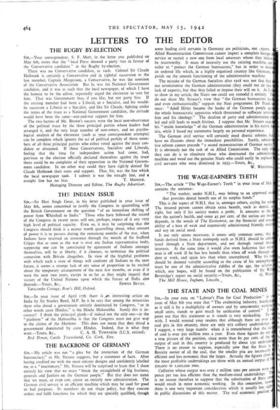THE INDIAN ISSUE
SIR,—Sir Hari Singh Gour, in his letter published in your issue of May 8th, seems concerned to justify the Congress in quarrelling with the British Government on the question " of an immediate shifting of power from Whitehall to India." Those who have followed the record of the Congress in recent years will not, perhaps, expect of it any very high level of political sagacity. Even so, it may be surprising that the Congress should think it a matter worth quarrelling about, what amount of power it is to possess during the remaining months of the war, when Indians have received an assurance through the mouth of Sir Stafford Cripps that as soon as the war is over any Indian representative body, supposing one can be constituted by agreement of Indians amongst themselves, will be at liberty, if it chooses, to terminate the political connexion with Britain altogether. In view of the frightful problems with which such a state of things will confront all Indians in the near future, it seems a strange lack of any sense of proportion to be excited about the temporary arrangement of the next few months, or even if it were the next two years, except in so far as they might imperil that victory of the United Nations upon which the future of India also


























 Previous page
Previous page